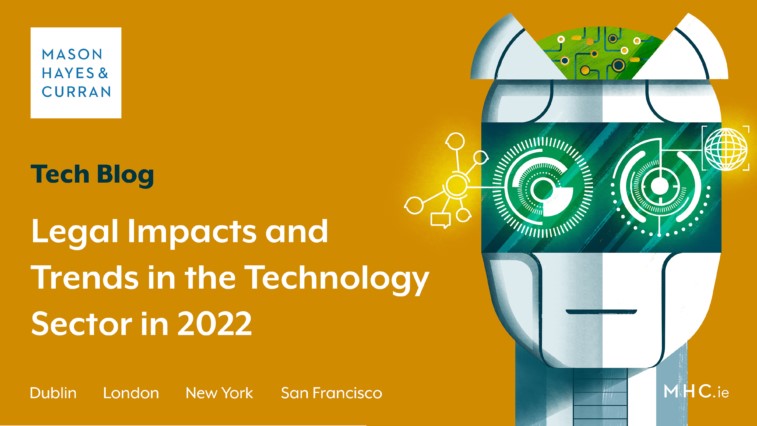Legal Impacts and Trends in the Technology Sector in 2022

We anticipate that two legal trends will continue to be highly relevant for organisations in 2022, namely:
- The decentralised workforce: over the past two years, remote working has become the norm and while providing increased flexibility for workers, there are related issues for organisations to address.
- Increased regulatory and legislative attention on the protection of individual end users of digital services and products: for several years regulators have already been looking at how to protect end users of digital services and products, however, more recently, relevant guidance and legislation has been published which puts this protection into sharper focus.
Decentralised workforce
As remote working becomes an increasingly common phenomenon and staff are able to work outside of their regional jurisdiction, the issues which arise are commonly categorised as human resources concerns. However, there are several other legal issues which need to be considered in parallel. These include the nuances of local employment law and the impact on payroll of local tax laws. There may also be complications from an establishment perspective, whereby having employees in a country other than the one in which the organisation is established could impact the laws which are applicable to the organisation.
Regulatory and legislative developments
Regulators and legislatures are putting the protection of individual end users of digital services and products on a more formal footing. These efforts include the recent publication by the Irish Data Protection Commission of its finalised guidance called the “Fundamentals for a Child-Oriented Approach to Data Processing”. The guidance introduces a child-centred / protection based approach to the processing of personal data of minors. This guidance helpfully fleshes out the GDPR and says that either a service must be child safe or designed in such a way that it cannot or will not be used by minors.
There is also the upcoming Directive on Contracts for the Supply of Digital Content and Digital Services. This Directive expands the application of traditional consumer protection law to cover a wide range of digital content and services, including videos, music files, software and social media. Requirements such as that goods must be fit for purpose are now applicable to digital content and services. The Directive also introduces novel obligations which require suppliers of digital content and services to provide updates to end-users, including security updates.
Other legal developments in this sector include the push by the European Council to adopt new rules regarding the role of technology companies generally and liability for user-generated content. Two pieces of legislation to keep an eye out for are the Digital Services Act and the Digital Markets Act. These introduce changes to the rules on competition and transparency. Changes are also being introduced to the collection of electronic evidence by law enforcement from large technology companies, particularly in cross-border scenarios.
Also on the radar for Ireland-based organisations is the upcoming transposition of the European Electronic Communications Code Directive (the EECC). The EECC reforms the old regime and intends to align the level of protection offered to end-users by traditional telecoms operators and newer online players, such as messaging service providers.
Finally, the Online Safety and Media Regulation Bill (a regulatory framework intended to govern user-generated content) is currently making its way through the Irish parliamentary approval procedure.
Conclusion
The legal landscape for the technology sector is evolving, with heightened protection being offered to end users and an increasing number of potential issues for organisations to grapple with. Technology companies should keep an eye out for these regulatory and legislative changes taking place in 2022 and carefully consider the issues which may arise due to the decentralisation of the workforce. In particular, providers of digital content and services should pay attention to the novel obligations being imposed on them, and seek legal advice where necessary.
For more information on any issues that may potentially affect your business operations, please contact a member of our Technology team.
The content of this article is provided for information purposes only and does not constitute legal or other advice.
Share this:




